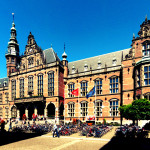‘Starbucks is a questionable political choice’
Quality education is a basic necessity for democracy to work, right? Everybody benefits from a smarter population because, ideally, the population votes and is in charge. Really, the less informed the people are, the worse off the country and society is. So, if we assume Starbucks is funding a shiny new library and benefitting our education by paying rent, isn’t that a great thing?
Well, sadly, it is only beneficial in the short term. We fund our education and democracy with tax euros. And Starbucks is hell-bent on paying the least possible tax it can pay. It does so by making deals with the Dutch government, with great success. Actually, you, kind reader, as a Dutch citizen or international student, probably pay a higher percentage of tax than Starbucks. And all of this is possible because Starbucks is partly located here in the Netherlands: a widely recognised tax paradise. That’s why walking into the library and seeing that big green obtrusive logo is a political thing. It is a political choice by the university, intended or not, to support the sourcing away of money up into the corporate hierarchy and away from the public cause of, for example, education.
Tax avoider
Of course, having a well-known tax avoider in a university raises questions of integrity. It also really makes you wonder about the legitimacy of the long-term vision of this institution, our university. If big moneymakers like Starbucks are permitted to not pay full tax, in the long run, the universities, as a tax-funded institution, will feel the sting of the scarcity that results. It’s quite simple: less tax means less money for universities. Really, the university is shooting itself in the proverbial foot. At the same time, we, the citizens, will still be carrying the burden of tax individually, but seeing less results, because collectively, the state is earning less.
Sure, I am oversimplifying. This one small Starbucks will not change much. All it will probably do is make non-machine coffee accessible only to a smaller and richer segment of the library visitors—if you’re poor, just walk a block. And no, all the problems won’t be fixed if Starbucks magically started paying more tax tomorrow. A coffee shop doesn’t affect academic integrity, and actually, the Netherlands is earning more money now than if it wouldn’t allow Starbucks to cheat a bit. After all, it’s all completely legal, and if we didn’t facilitate them and their wishes, they’d take their business elsewhere. Sadly, this is a worldwide problem.
Choice
But all of this does not make the housing of a Starbucks in our university less political. It is a choice to support the Netherlands as a tax haven, apparently made with disregard to the protest of the University Council. Tax avoiding multinationals are a symbol of the growing income gap and financial unsustainability of the neoliberal mentality globally. If the university, by proxy, chooses to support that, fine: then we know where we stand. It shows that our institution has, in this situation, acted out-of-touch, nihilistically and unwilling to take a symbolic stand for sustainability: not in the sense of fair trade, but for sustainability of a civil system that sustains them and our education: tax. At the same time, I’m typing this from an Apple computer, made by a well-known tax avoider. What that makes of me I’ll leave up to you, dear reader. This is just my two cents.
Michael Royall
Master’s student, Journalism
Correction: The term ‘tax evader’ has been changed to ‘tax avoider’.






